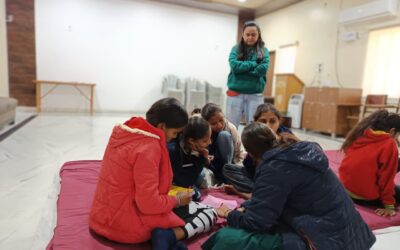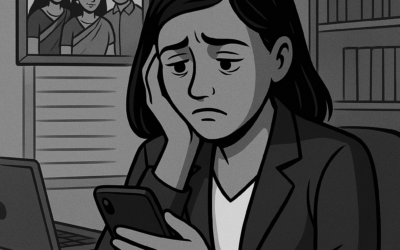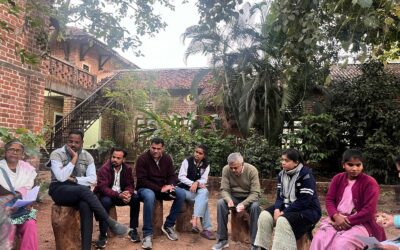There is something so insanely intimate and beautiful about sharing destinations.
I left Bahraich at 06:00PM that day, winters are in the balcony, evenings get foggy and the sun toodaloos away earlier. Had planned to leave for Lucknow at 05:30 but I left my office late. I sat in the Uttar Pradesh state government bus hoping to reach Lucknow by 09:00PM. My train for Haldwani was at 11:30.
The roadways bus stop in Bahraich is always crowded and chaotic. But it was a Thursday just before the long festive weekend, and other shirkers like me had planned their great escape, making the road to Lucknow and the usually crowded bus unbearably packed. I was fortunate enough to be sharing a three-seater seat with three and a half people. The fourth person was travelling only uptil Fakharpur, some 15- 20 minutes away and had very graciously only placed half his bum on the rexine seat. It left adequate congestion for all four of us to feel uncomfortable but not really complain.
My Co-seat Occupants
My co-seat occupants were all very chatty and we struck up a conversation. The girl next to me was finishing her B.Sc in Zoology from Mahila PG College, Bahraich. And the man next to me was traveling to give his NDA exam. A buff dude dressed in all black with a Haryanvi accent made the NDA backstory quite convincing. I am not sure who or why the fourth person was because it was evident that he was conserving his energy to hold onto the seat with half his bum and did not want to speak.
I do know that he had a bald spot at the centre of the back of his head, quite similar to an eagle’s nest. When I asked the girl why she chose to pursue zoology, she said she went to the Lucknow Chidiyaghar (zoo) once and decided she liked animals. I asked her if she had to dissect animals for her study. She grunted and made a inscrutable face. The uncle with the bald spot left soon after, followed by the girl who got down four stops later. She left me her phone number, inviting me to call her if ever I went to her village to try saunf (fennel seeds) ki sabzi.
The buff dude and I continued our conversation. He spoke about his dreams, why he chose army, his best friend, and a disconcerting amount about his best friend’s girlfriend. There was a traffic jam at Ghaghra ghat and the bus was delayed by an hour and a half. I did not have to worry about getting bored because dude kept no pauses between his sentences. I nodded along.
Things Got Creepy
Things got creepy real fast when he took out a can of sprite, mixed some powder in it and insisted that I take a sip. Upon refusal he grabbed my arm and put it on his head. “Aapko dosti ki kasam.” I got upset but in fear of making a scene I told him I was fasting, which was not entirely untrue. He quickly understood. Nodding his head. I quickly proceeded to pretend to fall asleep. There was no other seat empty in the bus and I was to travel alone from Avadh bus stop to the Lucknow railway station.
I sighed, realizing that in the buff dude’s mind, pestering me after I’d said no didn’t seem disrespectful. But the thought of forcing me to break my fast and offend Devi Ma—that was unimaginable to him.
I sighed, the weariness from the long day at office and the journey finally catching up. The bus rattled on inch by inch, lurching its way through the foggy evening, as if struggling against the pull of the night. I glanced at the buff dude from slit eyes, who had thankfully turned his attention to a video call, sparing me from any further pledges of friendship or shady concoctions. The girl’s phone number was still in my pocket, crumpled like an afterthought. I wondered if I would ever really try saunf ki sabzi in some remote village, or if that too was just one of those fleeting travel promises we make but never keep. The bus finally broke free from the jam at Ghaghra ghat close to 10PM.
Next Stop Kathgodam

The Kathgodam Lucknow express leaves the Lucknow Choti line at 11: 25PM sharp. Having known that, I reached the railway station at 11:22 laden with my backpack, a trolley and my unexercised asthmatic self. Chinmayee, my co-fellow, was only a few hours away. I had begun to daydream about hugging her as we met, rom-com styles and more importantly, had begun to feel the cold mountain winds in my hair and pahadi maggi in my mouth (which could in all likelihood be the wind from the AC blasting in my face and the bitter aftertaste of blood in my mouth from running to catch the train.)
“Haldwani mein padhai kar rahi ho?” my co-passenger asked me. She was a woman in her mid-forties adorned with traditional garhwali jewellery and attire. She was traveling with her family all decked out in their best garbs. Her husband and son were wearing crisp tuxedos. The son had already flung aside his blazer and was in the process of undoing his tie as his father adjusted and re-adjusted the luggage stuffed underneath the seats for the umpteenth time.
“Nahi Aunty, mein dost ko milne jaa rahi hu.” “Kesa dost? Ladka hai?” I visibly must have grimaced at her open curiosity because she rushed to explain. “Nahi nahi, bura mat maaniye ga.” She continued to explain that they were just returning from the wedding ceremony of her cousin who was working in a bank in Lucknow as a cashier. “She is very beautiful”. She quickly whipped out her phone and showed me photos of a girl in a red lehenga. Indeed. she was very beautiful.
“We went to celebrate her wedding but the boy turned out to be a fake.” Her husband grunts at this point, visibly uncomfortable with the oversharing and gives his wife a death stare, which she conveniently does not notice. “He lied about his job, telling us he worked in CBI but he was unemployed. You looked educated, I was wondering if your friend was a boy and if he was unmarried.“
I laughed and explained that unfortunately, for me and for her, my friend was a girl. She nodded, visibly disappointed at Chinmayee’s sex.
“It is God’s grace that we got to know just before the kanyadaan.”
I joked about the urgency of marrying her cousin off. “Kya jaldi hai?” “Beta, it’s not about urgency, it’s about saving face. After something like this, people start talking.” I suddenly realised why she did not really care about my caste or mother tongue. “In our community, if a wedding gets called off last minute, it becomes a story for everyone. It’s like a stain that doesn’t wash away easily. We have to find another boy quickly, for her sake.” Her cousin is twenty-four, only two years elder to me.
World Apart
The train rattled on, and I noticed her words hung in the air. The way she spoke, it was as if finding a groom was a matter of repairing an image, rather than ensuring a happy future. An urgency to restore what had been lost. I suppose it’s a lot to navigate, I thought to myself. The pressure must be exhausting. Her words stirred something in me, an awareness of the different worlds people inhabit even within the same compartment of a train.
Here was a woman on the same train, heading in the same direction, but carrying entirely different concerns and hopes. Her life seemed so entwined with the expectations of her community, while mine limited itself to seeing mountains and eating maggi.
It struck me then that, despite her eagerness to find a groom for her cousin—even asking a stranger like me for help—it wasn’t just about meeting expectations. It was also about caring, about trying to protect someone she loved from a world quick to judge and slow to forgive. The urgency, the racing against time, was just her way of shielding her cousin from pain, doing what she could to make the world feel a little safer, a little kinder for her sister. She was suddenly so so cool.
Haldwani To Sheharfatak (Bus 230rs; Time: 3hours)
“My son was born in Uttar Pradesh,” the woman in the faded maroon kurti said, catching me off guard. Her hair, streaked with gray, framing a face that showed the years on her features. She seemed eager to talk, her voice cutting through the gentle rumble and the occasional horn of the state bus. “Oh! In Lucknow?” I asked, assuming the most obvious answer. “No, in Haldwani,” she replied, her lips curling into a half-smile. She was joking. It took me a moment to remember that Uttarakhand had once been a part of Uttar Pradesh until it became a separate state in 2000.
She asked if I was studying, and I explained that I was working with a non profit. Her eyes lit up with a kind of recognition, and she leaned in slightly. As though this common ground was something she had been hoping for. All that she needed to start speaking to me. “I’ve been in the NGO sector for twenty-five years,” she said. “But recently, I took up the post of Lokpal in Nainital.” Her voice softened.
“Why the shift?” I asked.
She settled into the story, her hands resting on her lap as though they had earned a moment of stillness. “I’ve always been drawn to helping others,” she began. “Even as a girl, I couldn’t turn away when someone needed something.” She talked about how, during the COVID-19 crisis, she had arranged ambulances and oxygen for families gasping for breath. There had been other battles too, long before that—rescuing girls from abusive homes, finding them safe places, helping them rebuild lives.
“I run my own NGO,” she continued. She showed me her organization’s profile on her phone. Registered in 2020, it was still young, but it had taken on several causes. Women’s empowerment, child rights, health and sanitation, livelihood development. It was the kind of work that doesn’t have a clear finish line, where one measures progress in small victories and everyday struggles.
“Things have slowed down,” she admitted. “The organization’s activities have paused since my husband passed away.” Was he also involved in the NGO’s activities? I asked her. There was a brief silence, as though the bus itself were holding its breath in respect. “Yes. It was our dream project. I took the position as Lokpal to ensure a stable income. It’s not easy to keep things running without support”. She paused, her eyes drifting to the window, the pahadi landscape rushing past. “I’ve been looking for an investor,” she added quietly and asked me to let her know if I came across any leads. I assured her that I will.
“You Must Feel Proud”
There was an awkward silence that hung in the air, and for a moment, I didn’t know how to respond. “You must feel so proud,” I finally said, trying to break the stifling silence.
“Yes,” she said. “My son just got into Delhi University”. I had meant her own accomplishments. The decades of work, the courage to keep going, the resilience to find a new way forward. But I understood her pride in her son’s success. It was as if all the years of struggle, all the hours she had poured into helping others, had found a kind of meaning in this personal milestone. She reached for her phone again and showed me a picture of him, a young man with an easy smile, standing beside the university gate – UPSC interview style.
I wondered what it must feel like to give so much of yourself to a cause, only to find yourself seeking help for the very organization you had built. She got down near her office and promised to keep in touch.
Chinmayee was only a few hours away from me now.
Finally, Suni Bend

After buying a good broom for Chinmayee as a gift for hosting me, I hitched a ride with the most helpful lucky bhaiya to make my way to Suni Bend where Chinmayee’s organization Aarohi has a clinic.
The 10 seater converted into a 15 seater flashed a huge ‘lamgariya’ on the back window. She had grey hair, the lady who sat next to me, the lady next to her was her Devrani. A red thread choker and her long untied hair showed signs of just being out of water. The younger girls riding in front next to the driver’s seat had the red teeka on their forehead and hair tightly braided into knots. But their glittery shoes were on their laps. And the hems of their suit were a darker shade than the rest of the cloth piece.
Also read: Dindori – Parasi – Dindori
The girls had not had the same swimming experience as the ladies next to me. The jethani started speaking to me, asking me why I was in Sheharfatak. I asked her if there was a river nearby, clarifying their semi-dried hair as a cause for query. They clarified that there was a temple nearby where they had gone to take a holy dip in the river. I directed my questions to the girls sitting in front of me. “Did you girls not go?”
The two ladies started giggling. Their coyness increased my curiosity. Unmarried girls do not take dips in the river.
“Why? Ye koi maanyata hai kya?”
“Nahi, paani mei jayenge toh kapda chipkega na.” They giggle as they make circular motions around their breasts. After having grown up in Goa, where swimming in the oceans really didn’t come with thinking about if your breasts would show after a dip in the water, this was beyond my normal line of rational thinking. Not choosing to take a dip would be because of weather, high tides, hairstyles and on rare occasions if I had to use public transport afterwards or if I came in my own car.
“Oh! Mera toh bahut man tha nadi mein nahane ka. Mein iske pehle kabhi nahi nahayi.” They ask me if I was married and I responded with a no. I joke and say, “I am only twenty-two. I am too young.” The two ladies whisper to themselves about my age and go back and forth about how being unmarried at 22 in the city makes sense. Then they turn back to me and say, “Choti bhi nahi ho aur badi bhi nahi ho. Theek umar hai shaadi ki.”
Take Away

I have come to realize that the best aspect of traveling for so long is that it makes one weary. Weary enough to forget the notions you create about yourself and the walls you build. For someone who considers themselves extremely shy. This trip reminded me that I could talk. I could talk and hear and converse and learn endlessly. Each co-passenger had something unique to teach me.
The girl studying zoology showed me that sometimes, passion is sparked in small moments. Like how a single visit to the zoo can become a life’s calling. The buff dude, reminded me of the unspoken power that cultural beliefs and traditions hold over our interactions, often shaping boundaries more than we realize. The auntie from the train made me think about the subtle pressures we feel from our communities. Pressures that can sometimes dictate decisions more than personal preference, and the Lokpal woman’s story of resilience and adaptability challenged me to consider how to stay true to one’s values, even when life takes unexpected turns.
In each interaction, I found myself moving beyond my own preconceptions and judgments, and in return, each stranger offered me a glimpse into lives vastly different from mine. I could see how people’s priorities, even when they seem worlds apart, have their roots in similar desires: to belong, to protect, to connect, and to find purpose. We might come from different villages, cities, or states, but the hopes and concerns that bind us are strikingly familiar. It takes stepping into a crowded bus or an overnight train to remind ourselves that we are, in many ways, co-passengers in life.
This realization cost me only 841/- rupees and approximately 14 hours. Was it worth it … most definitely.
* Feature image clicked by Chinmayee, a night scene as seen from her Suni Bend clinic




0 Comments